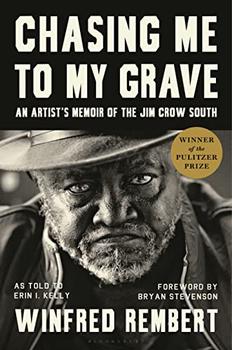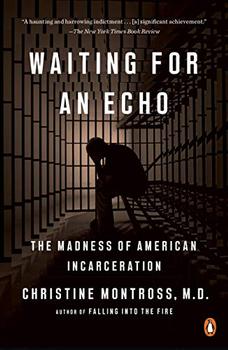Summary | Excerpt | Reviews | Beyond the book | Read-Alikes | Genres & Themes | Author Bio

Voted 2019 Best Debut Author Award Winner by BookBrowse Subscribers
According to statistics from the United States Bureau of Labor, between 80,000 and 100,000 people are held in solitary confinement per year, a condition critics claim is specifically designed to break the human spirit through extreme isolation and restriction. Albert Woodfox spent 43 years in solitary, but he endured, and now shares his powerful story in this insightful memoir.
Born in 1947, Woodfox grew up in a time of openly state-sanctioned segregation and discrimination. When his family moved to a poor and working-class black ward in New Orleans, Woodfox began to see and feel these realities for the first time. He witnessed black men and boys harassed, assaulted and charged by police without cause (see "Black Incarceration and Sentencing" for more on this topic). Yet he would not learn the depth of these social issues for years. As an adolescent and young adult, he shoplifted food as a means of survival, but he quickly degenerated to more serious crimes, causing harm to a community already contending with poverty and police scrutiny/violence.
In and out of juvenile centers and prisons, Woodfox developed a criminal reputation, eventually entering Angola—the Louisiana State Penitentiary—in 1965, and returning in 1969. Angola was once a slave plantation. In 1869, a slave trader's widow leased the land to a former confederate major, who worked leased inmates under slave conditions to farm the land (see "The Legacy of Slavery and Prison Labor" for more on this topic). Hundreds died each year. In 1901, the state of Louisiana bought the land and turned it into a penitentiary, retaining the name "Angola," the country where the plantation's original slaves were born. When Woodfox arrived in the mid-60s, the prison was run by the "freemen"— white security guards who descended from generations of Angola workers. Inmates were regularly subjected to violence and brutality, gassed, beaten, harassed and raped.
After years of breaking laws, serving sentences and enduring police abuse, Woodfox fled to Harlem to escape another bid at Angola for armed robbery. It was here that he was introduced to the Black Panther Party. They unified the city by engaging in community work, from free school breakfast programs to literacy, education and outreach efforts. He marveled at their confidence and lack of fear. Woodfox soon found himself back in prison in New York when the authorities caught up with him, and there he met more Black Panthers, many of whom would later be released, proven innocent of charges against them. Instead of engaging in the often violent, inhumane inmate culture, the imprisoned Black Panthers acted with respect and kindness. To Woodfox, "they acted like they weren't even in prison." The Black Panthers asked fellow inmates what they needed, sharing food and clothes; they asked who could not read and began educating and sharing books with those around them, including Woodfox. This was his turning point. He read, related, analyzed and debated the words of Mao Zedung, Ho Chi Minh, Chou En-lai, Fidel Castro, Che Guevara, George Jackson, Frantz Fanon and Kwame Nkrumah. In connecting to their words and learning from their teachings, Woodfox transformed: "We knew from experience that by changing, we gained more than we lost. We got more awareness. We got more compassion. We talked about how the entire human race needed to raise its consciousness, not as individual races or groups, but as humans, as a species."
Woodfox was transferred back to Angola for his third bid there, but this time he was armed with new morals, values and principles. He was radically different. Upon arrival, he connected with imprisoned Black Panthers and officially joined the Party. Together, they worked within the prison—through hunger strikes, protests, litigation, defiance and media outreach—to bring humanity back to Angola.
The unrest and solidarity of inmates was viewed as a threat to the prison system. When corrections sergeant Brent Miller was murdered in 1972, officials seized the opportunity to pin the crime on the Black Panthers. Woodfox was sent to solitary confinement, alongside two other Panthers, Herman Wallace and Robert King. These political prisoners became known as the Angola 3. One of the wardens would later describe Woodfox as a "hardcore Black Panther racist" in court.
Woodfox was convicted, despite there being no physical evidence and no reliable eyewitness testimony connecting him to Brent Miller's murder. In fact, the primary testimony used against him was given by a serial rapist who was proven to have been paid off and released by Angola officials. Solitary describes how this injustice happened: delays in gaining a lawyer of consequence; lack of random, unbiased jury selection; misconduct and false accusations from prison officials; failure to properly document, record and store evidence; negligence of proper conduct in the attempt to gain statements; and general prosecutorial misconduct. By the 2000s, countless human rights activists and organizations stood behind the Angola 3, including Critical Resistance, Amnesty International, the Malcolm X Grassroots Movement, Solitary Watch, and the National Association for the Advancement of Colored People.
In 2016, Woodfox was finally released, the result of decades of appeals to the courts. He plead no contest to reduced charges, meaning he did not admit guilt, but accepted he could not prove innocence, due largely to a number of people involved in the original trials being deceased and unavailable for questioning. This was Woodfox's final round of appeals, and he chose freedom over justice. Today, he is still adjusting to life outside of solitary confinement. Despite the decades spent in Angola, he maintains hope.
Relatively few people will ever experience the horrors of solitary confinement, but in this narrative reflection, readers will see themselves. This is what makes Solitary such a weighty and worthwhile read. Running parallel to Woodfox's experience with the judicial system is his trek into social activism. This subplot creates something of a redemption story, a moving testament to our potential for growth, regardless of circumstances and past decisions. It is proof that a strong belief system paired with a like-minded community can catalyze change. Woodfox's unwillingness to break—his strength and determination—is a lesson bestowed to those who are just entering the world of social struggle, as well as a reminder to those who have been fighting these battles for decades. Whether it's prison reform, racism, classism, or other ideologies and causes, the message is the same: Do what can be done, wherever it can be done, to better the world.
Readers curious to learn more about Albert Woodfox may wish to listen to his 2005 interview about activism with Prison Radio or read his recent interview about Solitary with NPR.
![]() This review was originally published in The BookBrowse Review in March 2019, and has been updated for the
January 2020 edition.
Click here to go to this issue.
This review was originally published in The BookBrowse Review in March 2019, and has been updated for the
January 2020 edition.
Click here to go to this issue.

If you liked Solitary, try these:

by Winfred Rembert
Published 2023
Winfred Rembert grew up in a family of Georgia field laborers and joined the Civil Rights Movement as a teenager. He was arrested after fleeing a demonstration, survived a near-lynching at the hands of law enforcement, and spent seven years on chain gangs.

by Christine Montross
Published 2021
Galvanized by her work in our nation's jails, psychiatrist Christine Montross illuminates the human cost of mass incarceration and mental illness
Be careful about reading health books. You may die of a misprint.
Click Here to find out who said this, as well as discovering other famous literary quotes!
Your guide toexceptional books
BookBrowse seeks out and recommends the best in contemporary fiction and nonfiction—books that not only engage and entertain but also deepen our understanding of ourselves and the world around us.